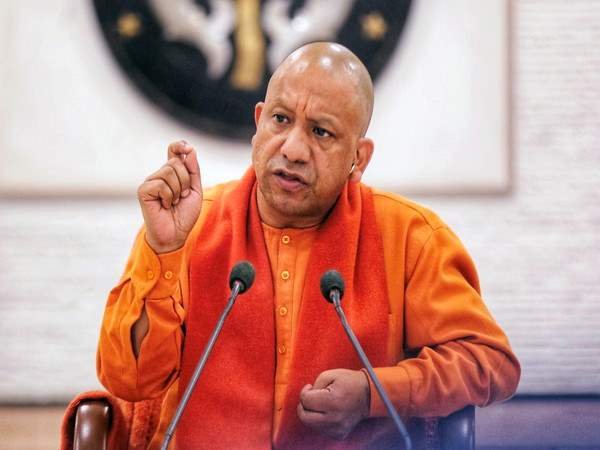Every non-Muslim country in the world needs leaders like him.
He says:
Any Muslim who wants Islamic Sharia law should leave for Sharia-based countries by Wednesday. Because, not only India but many countries around the world view radical Muslims as terrorists.
That’s why every mosque in the state will be inspected, and Muslims should cooperate with us in this inspection!
Those who have come from outside the country will have to adapt to living in the state, not expect Indians to change for them…!
And I assure the people of India that whatever we are doing, it is in the best interest of the people of India!
Here, we speak Hindi, not Urdu or Arabic. So, if you wish to live in this country, you must learn Hindi and Sanskrit…
In our India, we worship Lord Shri Ram and Shri Krishna as divine beings, we follow our Sanatan, Sikh, Buddhist, and Jain religions, and we do not follow any other religion!
That is why pictures of our deities, idols, and religious texts are worshiped everywhere…!
If you have any objection to our idols and religious texts, you are free to leave India and go anywhere in the world!
India is our motherland, our Mother Earth, our culture, and our civilization. But that does not mean we are communal…!
We do not follow your religion, but we respect your sentiments…! You are free to practice your religion peacefully…!
So if you need to pray, do not create noise pollution…!
Do not pray in our offices, schools, or public places…!
Pray quietly at home or in the mosque, so that it does not disturb us…!
If you have any complaints about our flag, national anthem, religion, or way of life, then you are free to leave India right now
Here are some relevant case studies and examples that align with Yogi Ji’s message, demonstrating how different countries and leaders have dealt with the challenges of migration, radicalism, and the integration of diverse cultures:
- France’s Ban on Religious Symbols in Public Schools
Case Study: In 2004, France passed a law prohibiting the wearing of religious symbols, such as Islamic headscarves, in public schools. This move was a part of the French policy of laïcité, or secularism, which aims to keep religion out of the public sphere, ensuring that all citizens are treated equally regardless of faith. The law was expanded in 2011, banning full-face veils in public spaces.
Relevance: France’s strict stance on religious expression in public institutions echoes Yogi Ji’s insistence on respecting the national culture and traditions of a country. The French government emphasized that migrants or those practicing different religions should integrate into French society and respect its secular values, rather than imposing their own religious customs.
Outcome: Although the move sparked controversy and protests, the law remains in place, reflecting France’s commitment to preserving its secular identity. France continues to enforce these laws, asserting that newcomers must respect the country’s culture and legal framework.
- Germany’s Stance on Migration and Integration
Case Study: During the 2015 refugee crisis, Germany accepted over one million refugees, many from Muslim-majority countries. Chancellor Angela Merkel advocated for their integration, but the government also set clear expectations that migrants must respect German laws, learn the German language, and integrate into society. However, over time, concerns about the rise of radicalism and cultural clashes emerged, leading to increased scrutiny of refugee and migrant populations.
Relevance: Yogi Ji’s call for migrants to adapt to India’s culture, language, and laws mirrors Germany’s approach. The German government emphasized that while they welcomed refugees, it was crucial for them to embrace Germany’s social values and integrate fully into the society rather than forming isolated communities.
Outcome: Germany later introduced stricter policies on migration and integration, with increased emphasis on mandatory language courses and adherence to German laws. The challenges posed by cultural clashes, especially related to Islamic radicalism, pushed Germany to reconsider its open-door policy, highlighting the need for clear integration strategies.
- Japan’s Strict Immigration and Cultural Homogeneity
Case Study: Japan has long maintained a strict immigration policy, allowing only a small number of refugees and migrants into the country. The Japanese government emphasizes preserving cultural homogeneity and national identity. Even when accepting foreign workers, Japan requires them to adapt to Japanese customs, language, and values. The country remains resistant to large-scale migration, citing the need to protect its cultural and social fabric.
Relevance: Japan’s immigration policy reflects Yogi Ji’s perspective that outsiders must adapt to the host nation’s culture and values. Japan places its national identity and cultural continuity above accommodating diverse ideologies or practices. Japan’s emphasis on protecting its way of life is similar to Yogi Ji’s defense of Indian culture and Sanatan Dharma.
Outcome: Japan’s policies have resulted in minimal cultural conflict or radicalization within its borders. By controlling migration and ensuring that newcomers integrate fully, Japan has avoided many of the societal challenges faced by other countries dealing with large-scale immigration and religious radicalism.
- Denmark’s Approach to Combating Radicalism
Case Study: Denmark has implemented strict policies to counter Islamic radicalism, including measures to deport foreign imams who preach extremist ideologies, limit the construction of new mosques, and monitor radical Islamic groups closely. Denmark has also introduced assimilation programs that emphasize the importance of adopting Danish values, learning the language, and respecting the country’s democratic principles.
Relevance: Denmark’s approach to dealing with radicalism and integration is in line with Yogi Ji’s call for Muslims in India to respect local customs and traditions. Denmark insists that those who live in the country must adhere to its laws and cultural norms, and anyone promoting extremist ideologies will face severe consequences.
Outcome: Denmark’s strict policies have helped reduce the influence of radical Islamic groups and minimized the spread of extremist ideologies. The government continues to prioritize the integration of migrants into Danish society, ensuring that they respect and adhere to the nation’s values.
- Myanmar’s Approach Under Ashin Wirathu
Case Study: Ashin Wirathu, a Buddhist monk in Myanmar, led a nationalist movement encouraging the Buddhist majority to boycott Muslim businesses and restrict the influence of Islam in the country. His movement, symbolized by the number “969,” gained traction by promoting the preservation of Buddhist values against what was perceived as a growing Islamic threat. His controversial rhetoric led to widespread anti-Muslim sentiment and violence, including the persecution of the Rohingya Muslims.
Relevance: Yogi Ji’s message bears some similarities to Ashin Wirathu’s nationalist campaign, particularly in terms of promoting the defense of indigenous culture and religion against external threats. While Yogi Ji emphasizes peaceful coexistence, he also asserts that those who seek to impose foreign ideologies on India should leave, just as Wirathu encouraged Burmese Buddhists to resist Islamic influences.
Outcome: While Wirathu’s campaign has been condemned internationally for inciting violence and discrimination, it also resonates with nationalist movements that seek to preserve the dominant culture of a country. Myanmar’s treatment of the Rohingya Muslims, though widely criticized, reflects the extreme end of the cultural defense spectrum.
- The United States: Travel Ban and Immigration Restrictions
Case Study: In 2017, the Trump administration implemented a travel ban targeting several Muslim-majority countries, citing national security concerns and the need to prevent radical Islamic terrorism. The policy faced legal challenges, but the administration justified the ban as necessary for protecting American citizens from potential terrorist threats. The U.S. government also increased vetting processes for immigrants and refugees, particularly those from conflict-ridden regions.
Relevance: The U.S. travel ban echoes Yogi Ji’s call for safeguarding national security and cultural integrity. While the U.S. allowed freedom of religion, it placed restrictions on immigration from countries associated with radicalism, arguing that the country must prioritize its own safety and stability over accommodating migrants from regions with ties to terrorism.
Outcome: The travel ban was eventually upheld by the U.S. Supreme Court, reflecting the government’s right to control immigration in the interest of national security. This case highlights how nations grapple with balancing humanitarian concerns and the need to protect their citizens from external threats.
Conclusion:
The case studies above illustrate how different countries have handled the challenges of radicalism, cultural integration, and the defense of national values. Yogi Ji’s message shares elements with these approaches, particularly the emphasis on respecting the host country’s culture, laws, and traditions. The central theme in each of these examples is the need for assimilation and the rejection of ideologies that conflict with the nation’s core values, much like Yogi Ji’s call for preserving India’s cultural and religious heritage.
Yogi Ji’s statement reflects a bold and confident stance, addressing the challenges posed by radicalism and asserting India’s cultural and national identity. This approach, while controversial, aims to protect and promote the values that Yogi Ji believes are central to India’s integrity, unity, and harmony. His message emphasizes the importance of assimilation, respect for the nation’s traditions, and a call for non-interference in India’s established cultural and religious practices.
Expanding on Yogi Ji’s Message:
- The Courage to Defend National Identity: Yogi Ji’s words require immense courage. In a world where political correctness often overrides difficult conversations, his statements confront the realities many nations face due to the rise of radicalism and cultural incompatibilities. By openly challenging those who advocate for Sharia law and radical ideologies, he sets a precedent that non-Muslim countries around the globe need to protect their national values and legal systems without succumbing to external pressures. His message is clear: India will not accommodate ideologies that clash with its foundational principles.
- A Call for Global Leadership: Yogi Ji’s approach could be seen as a model for other non-Muslim countries grappling with similar issues. Countries across Europe, the Americas, and Asia are facing growing concerns about radicalism and cultural tensions due to immigration and differing ideologies. Yogi Ji’s bold declaration that India will not change its culture or laws to suit outsiders could inspire other leaders to take similar stands, ensuring that immigrants respect the host country’s values rather than imposing their own.
- Integrating, Not Dividing: His statement urges Muslims who wish to live under Sharia law to seek residence in countries where such laws are already in place. This call for cultural and legal integration emphasizes that anyone coming to India must adapt to its traditions, language, and lifestyle rather than expect the nation to accommodate foreign ideologies. Yogi Ji reminds everyone that India has its rich tapestry of religions, such as Sanatan Dharma, Sikhism, Buddhism, and Jainism, which form the cultural backbone of the country. He makes it clear that the expectation is for everyone to respect these values.
- Protecting India’s National Language and Heritage: Yogi Ji’s emphasis on the use of Hindi and Sanskrit is a reminder that language is central to national unity. In urging residents to learn Hindi and Sanskrit, he reflects on the importance of linguistic unity as a tool for social cohesion and national identity. While acknowledging the diversity of languages, Yogi Ji affirms that India’s linguistic heritage must be preserved, and residents should align with the country’s cultural fabric.
- A Reaffirmation of Religious Freedom – With Boundaries: Yogi Ji clarifies that while India respects religious freedom, this freedom comes with boundaries. India is a secular state, but the nation’s roots lie in its long-standing spiritual traditions of Sanatan Dharma, Sikhism, Buddhism, and Jainism. He reinforces the idea that India is open to religious practice, but this practice should not interfere with the lives of others. Yogi Ji’s statement that Muslims are free to practice their faith peacefully—without creating disturbances or demanding preferential treatment—highlights a balanced approach to freedom of religion.
- Addressing Noise Pollution and Public Spaces: The specific request not to pray in public spaces or create noise pollution is an assertion that religious practices should respect the rights of others. Yogi Ji’s message resonates with many people who believe in maintaining public order and limiting disruptions. His insistence on practicing religion quietly, whether at home or in mosques, ensures that all citizens, regardless of faith, can live in peace without impositions.
- Respecting National Symbols: Yogi Ji’s firm stance on respecting national symbols—such as the flag, the national anthem, and Indian traditions—reinforces the idea of unity and patriotism. In his view, anyone who objects to these fundamental aspects of Indian life should reconsider their place in the country. This call for respect of national symbols echoes a broader message of allegiance to the nation above all else.
- Upholding India’s Cultural Sovereignty: At the heart of Yogi Ji’s message is a defense of India’s cultural sovereignty. He affirms that India’s civilization, history, and traditions are non-negotiable, and those who live in the country must respect its ethos. His message reflects the belief that a nation’s strength lies in its ability to preserve its cultural heritage, even while embracing modernity.
Conclusion:
Yogi Ji’s statements, while provocative, speak to a growing sentiment in many nations struggling with the challenges of immigration, cultural integration, and radicalism. His message is one of strong national identity, cultural preservation, and the need for unity in diversity—asserting that while India respects all religions, it will not compromise its traditions or allow external ideologies to disrupt its way of life.
In urging other nations to adopt similar stances, Yogi Ji emphasizes the importance of leadership that is unafraid to defend national values. His call for respect, unity, and cultural integrity is a message that resonates far beyond India, especially in an increasingly globalized world where national identities are being tested.







